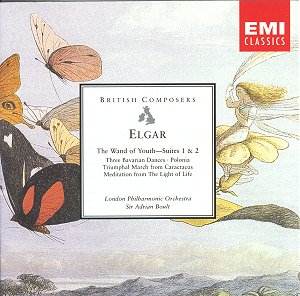This is a welcome reissue (for the first time on CD,
I believe) for some of Sir Adrian Boult’s recordings of lighter music
by Elgar. The fact that the music is "light" compared to,
say, Elgar’s symphonies, doesn’t mean that it is easy to play or conduct.
In fact, quite the reverse is true. Very rightly, Boult pays all this
music the compliment of taking as much care over it as if he were dealing
with one of Elgar’s major works and so do the LPO.
The two Wand of Youth suites date from 1907-8,
precisely the period when Elgar was hard at work on his first symphony.
For much of the material he went back to sketches made during his youth
and fashioned these recycled fragments into two charming suites of miniatures.
The music is entirely characteristic of the composer and is wholly without
artifice. I suspect the composition of these suites was a welcome diversion
from the serious work of writing a symphony.
Under Boult’s seasoned direction the LPO play the First
Suite beautifully. Particularly enjoyable are the Mendelssohnian lightness
of ‘Sun Dance’ (track 4), the delicate enchantment of ‘Fairy Pipers’
(track 5), and the gaiety and frolics of ‘Fairies and Giants’ (track
7).
The performance of Suite Number 2 is no less successful.
‘The Little Bells’ (track 9) is quite delightful. So too, in a different
way, is ‘The Tame Bear’ (track 12) and ‘Wild Bears’ (track 13) brings
a rumbustious conclusion.
The Three Bavarian Dances are orchestral versions
of three of the six part songs which make up From the Bavarian Highlands.
(1894). Elgar made these arrangements in 1897. Having sung in performances
of the original songs several times I must say that I rather miss the
dimension of the human voice (even if the words are pretty dire!). However,
the arrangements are effective and Boult does them well here. This is
not first rank Elgar by any means but, as always with this composer,
the music is never less than expertly crafted.
Polonia, composed in 1915, is an occasional
piece, an orchestral fantasia on national airs and, as such, unique
in Elgar’s output (though in 1914 he had produced Carillon, a
setting for speaker and orchestra of a Belgian poem). Carillon was
written specifically in support of the Belgian war effort and Polonia
too was written for a wartime benefit concert, in this case for Polish
relief. Elgar combined fragments of music by Chopin and Paderewski and
for the ending brought in the Polish national song, ‘Poland is not lost’.
This provides a grandiose conclusion to the work where the organ reinforces
the orchestral texture. As I said, it’s an occasional piece but it is
orchestrated with all Elgar’s considerable skill and it is no mere pot-boiler.
Boult gives it a dedicated, confident performance.
The concert also includes the Triumphal March from
Caractacus. As Michael Kennedy reminds us in his note, this is
not a chauvinistic piece for it depicts not a British victory but rather
the triumph of the Romans who have just conquered Caractacus and his
Britons. The performance here is splendid, full of panache and grandeur
but also recognising the melancholy of the vanquished.
To conclude Boult gives us the Meditation from Elgar’s
early oratorio, The Light of Life (1896). This is fairly early
Elgar but it is good stuff, all the same. In fact the whole oratorio
is unjustly neglected. If I may borrow a typically felicitous phrase
of Michael Kennedy, from another context this music "immature though
it may be has the name Elgar running through it like Blackpool through
rock." The Meditation is the prelude to the oratorio. Boult invests
the music with an appropriate dignity and it flows smoothly. What a
shame that he was never asked to record the full work.
In summary, this is a most desirable collection. Without
exception the performances are as good as one could wish, being well
played and conducted with a quiet authority. The sound is good EMI 1970s
vintage (which was pretty good) and wears its years well. There are
two short but good notes (because this CD draws on two LP issues) which
are both by noted Elgarians, Percy Young and Michael Kennedy. This issue
can be recommended with confidence.
John Quinn


